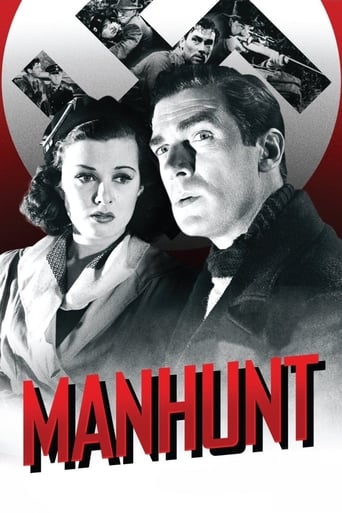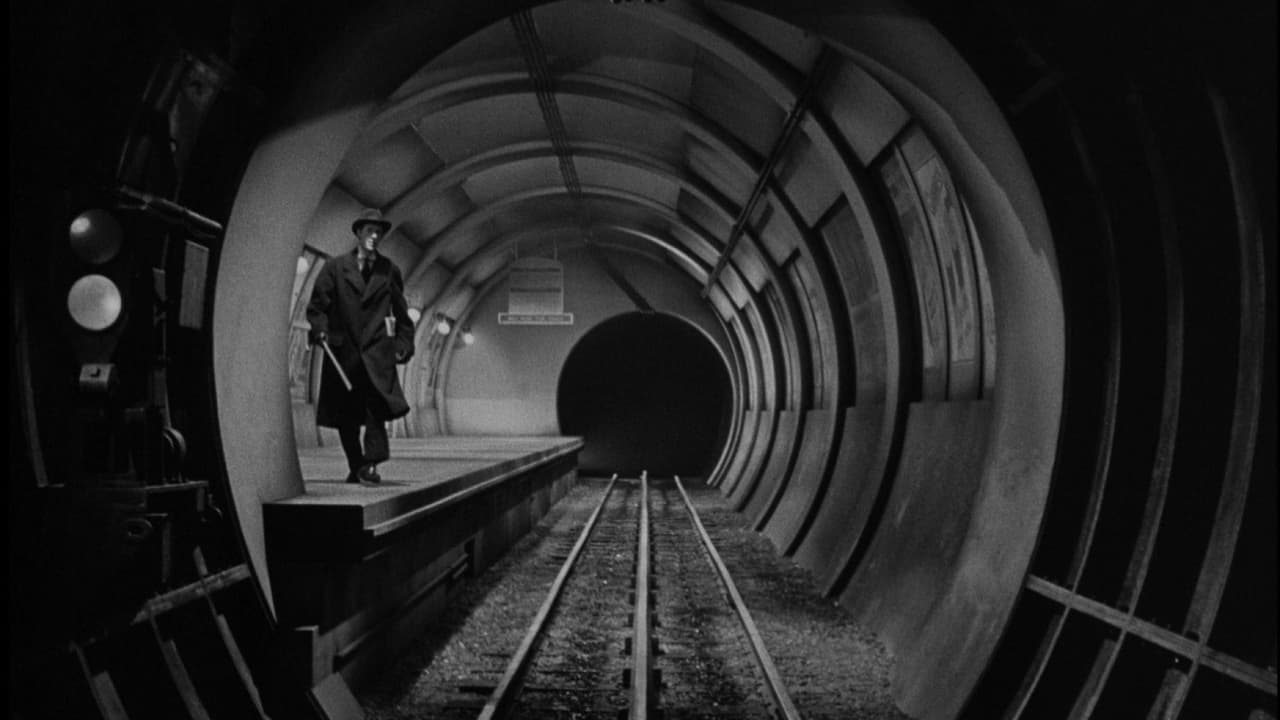christopher-underwood
Directed by someone other than Fritz Lang, this strange mix of thriller, romance and anti-nazi propaganda would probably have fallen apart. Under Lang's ever focused cinema eye and noir inclinations this is transformed from some 'Boy's Own' or Biggles adventure to a surprisingly strong attack on the then surging forces under Hitler. Walter Pidgeon is only okay in the lead and Joan Bennett struggles a little with the cockney accent but together they rub along well and Bennett looks great throughout with her sparkling eyes. George Sanders is far too good as the big bad man working for the forces of evil within the US and if the ending is a little drawn out, these three help to make this such an enjoyable and just believable yarn. It is those dark and wet London streets with the deep noir shadows that provide the overriding atmosphere and mean that the film is just as watchable today as it must have been to, I imagine, astonished audiences back in the day.
evanston_dad
TCM host Robert Osborne could sell me a three-dollar bill.What he promised with "Man Hunt" was a superb thriller expertly directed by Fritz Lang. What I got was a perfectly entertaining but not especially remarkable thriller with serviceable if not distinguished direction by Fritz Lang. Walter Pidgeon plays a big-game hunter who's captured by the Nazis and accused of trying to assassinate Hitler and then escapes, only to be hounded by them upon his return to London.George Sanders, playing the German officer in charge of the man hunt, is the reason to see this one. Joan Bennett supplies a lovely face and an atrocious Cockney accent.Based on other Fritz Lang movies I've seen, there's absolutely no reason he himself could not have turned this into a WWII-era classic, but as it was I spent the whole movie thinking how much more stylish and memorable it might have been in the hands of a director like Carol Reed.Grade: B
secondtake
Man Hunt (1941)Offhand the title and idea to this movie sounds a bit routine--a man singlehandedly avoiding authorities and pursuers. Even the extra theme that the Nazis are the bad guys sounded well worn, though the fact it was shot and released during that interesting two year period of WWII before the Americans got involved is something of a hook.But I watched mainly because the formerly German director, Fritz Lang, is one of the handful of best directors ever.And it pays off. The clichés are made fresh--even the Nazi types are different than you'd expect. The filming is great, showing the use of shadows and ominous points of view that film noir would take up in the next couple of years. And the plot has a mixture of one man against the world survival as well as boy meets girl romance. It's terrific stuff, hardly dated at all. And the cinematography is by one of the stalwarts of the period, Arthur Miller, so it has lots of moving camera and interesting tight compositions.The main character Alan Thorndike is played by Walter Pidgeon, one of those leading males who hasn't always stood up well over time. The deep voice, nice guy quality he is famous for isn't always matched by a pertinent acting intensity. His physical presence in a film is often a shade unconvincing. Lang might have found a perfect balance here because Thorndike's situation is so harsh, at least at times, and there is often a contrasting focus on Pidgeon's face and the innocence it is so good at projecting.Oddly (and maybe with some political savvy, who knows), Pidgeon is a Canadian playing a Brit, with no attempt at an accent, so this supposedly patriotic movie has a weird falseness in every scene. The reason this might be on purpose is it's carried through all along--the leading woman, Joan Bennet, is a New Jersey girl who has adopted a strong Irish (I think, or Cockney) accent. And the main Nazi is played by upper crust British legend George Sanders (who was born in Russia). And so goes this international plot. Of course, Lang was an expatriate German Jew working for Hollywood. He was becoming known for his anti-Nazi fervor to the dismay of the right wing Hays Code commission, which we now understand better. Lang's penchant for shooting at night (which goes back to his days in the German film industry) and his ability to make people sinister without actually showing them doing sinister things is partly why this simple movie works. It's also made complicated by the large range of locations used (or invented in the studio), and by the irony of the sweet love affair in the wings in the second half.You might say it's a propaganda film if you want to use that word loosely. It does at the very end send a message to the viewers, and to Hitler, that the British are out to get him. But really this is a movie about good against evil, about free thinking versus doing what you're told. And about love, completely unfulfilled, but so incipient you feel it and want it.Yes, see this, if you like movies from the period, or know you like Lang's films. Or if you like film noir, since this is a pre-cursor. Or see it if you appreciate a very well made film with an edgy historical setting.
oOgiandujaOo_and_Eddy_Merckx
For me the central point of what is a multifaceted movie is one of ethics. Captain Thorndike is a big game hunter of repute who never shoots his prey, he gets it in his sights and then recognises that he's "won the game". He's essentially an anarchist in that he talks at several points about being against all forms of force (politically speaking some types of anarchists generally talk in terms of the path of least coercion). He is faced with a decision, which fortunately, few of us in the country where most of this film is shot (the UK), have to make any more. When one is faced with extreme murderous brutality (the Nazis), extinguishing personal freedoms, should one fight back with lethal force? People have called this aspect of the movie propagandist, a manipulative attempt to get the USA to join the war, but I think Fritz Lang poses this question in earnest and with his heart on his sleeve. Despite our distance from questions of such magnitude (the war against operations such as Al Qaeda has effectively been assigned to bureaus or outsourced, and do not ask these questions of us on an individual basis), it's a question which I found very involving.Fritz Lang's movie has in common with Powell & Pressburger's film from the same year, the 49th Parallel, that both treatments of the Nazis display a great deal of respect, leaving you to question on some level whether they don't deserve to win. Thorndike is both a rank below, and Lang suggests, an inferior hunter to, his nemesis the Nazi Major Quive-Smith. Only by breaking through British class barriers and finding love will Thorndike be able to triumph. Reference is made to the policy of appeasement and to appallingly stupid British officialdom, more evidence of a movie which is far from a stupid and absurdly partisan propaganda piece.Some of the movie comes off as a little odd, such as a repeated reference to the Nazis returning to decapitation as method of execution, which seems rather a minutia given that the UK and US were both hugely fond of capital punishment at the time. The love story creaks a bit and makes the middle of the movie somewhat of a longueur. Contrivances in the plot are acceptable, but may cross a threshold for some.On an aesthetic and visceral level there are some great tracking shots, and the Nazis have been appropriately fetishised. Popular modern belief that behind each swastika there was a caring sharing yet misguided person is hugely erroneous, death-worshipping pagans, members of what was a hugely ideological cult, being more accurate in my view. The shot of Quive-Smith and goons in Jerry's apartment is high-calibre work reminiscent of the expressionist silent work of the director's earlier years. Personally I found the fist fight hugely brutal and exhilarating, which is very rare in a movie of that period, or indeed any other. In terms of a "...from hell's heart I stab at thee" level of gusto, the ending of the movie is as electrifying as the famous ending to 13 Rue Madeleine.By the by Quive-Smith is an enormously interesting character. There's huge testament to Lang's subtlety in the Kehlsteinhaus (Eagle's Nest) scene. An outwardly confident character with no hint of turmoil stands next to a lampshade where votive music in Old German is written, "...nur deine güt hilft, mir aus den nöthen." ("... only you can help me out of my suffering"). In the next scene he is backgrounded by a sculpture of Saint Sebastian pierced through with arrows. This a wounded man, in need of putting out of his misery. Lang's suggestion regarding Nazis generally? Obviously a man of genius who snuck a lot of stuff about fate in under the radar.



 AD
AD



